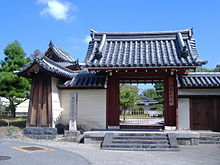Hokke-ji: Difference between revisions
HeartofaDog (talk | contribs) m typo |
→Further reading: added link |
||
| (39 intermediate revisions by 30 users not shown) | |||
| Line 1: | Line 1: | ||
{{Short description|Buddhist temple in Nara, Japan}} |
|||
| ⚫ | |||
{{For|other temples of the same name|Hokke-ji (disambiguation)}} |
|||
| ⚫ | |||
{{Use dmy dates|date=July 2019}} |
|||
{{Infobox religious building |
|||
| ⚫ | Hokke-ji was built by [[Empress Kōmyō]] in 745, originally as a nunnery temple on the grounds where |
||
| name = Hokke-ji |
|||
| native_name = |
|||
| image = Hokke-ji.jpg |
|||
| image_size = |
|||
| alt = |
|||
| caption = The entrance |
|||
{{Infobox mapframe|tyep=shape|zoom=14|frame-width=220}} |
|||
| map_type = |
|||
| map_size = |
|||
| map_alt = |
|||
| map_caption = |
|||
| location = 882 Hokkeji-chō, [[Nara, Nara|Nara-shi]], [[Nara Prefecture|Nara-ken]] |
|||
| coordinates = |
|||
| religious_affiliation = Kōmyō |
|||
| deity = [[Kannon|Juichimen Kannon]] (Avalokiteśvara) |
|||
| country = Japan |
|||
| functional_status = |
|||
| website = https://hokkejimonzeki.or.jp/en/ |
|||
| founded_by = [[Empress Kōmyō]] |
|||
| year_completed = 745 |
|||
}} |
|||
| ⚫ | |||
| ⚫ | |||
| ⚫ | Hokke-ji was built by [[Empress Kōmyō]] in 745, originally as a nunnery temple on the grounds where her father [[Fujiwara no Fuhito]]'s mansion stood. According to records kept by the temple, the initial construction went on until around 782. It once had a large complex with several halls, gates, and two pagodas. |
||
| ⚫ | |||
| ⚫ | |||
| ⚫ | |||
| ⚫ | |||
| ⚫ | |||
| ⚫ | |||
== See also == |
|||
* For an explanation of terms concerning Japanese Buddhism, Japanese Buddhist art, and Japanese Buddhist temple architecture, see the [[Glossary of Japanese Buddhism]]. |
|||
*[[List of National Treasures of Japan (paintings)]] |
|||
*[[List of National Treasures of Japan (sculptures)]] |
|||
== Further reading== |
|||
*[[Lori Meeks]], ''Hokkeji and the Reemergence of Female Monastic Orders in Premodern Japan'' (2010) [https://www.amazon.com/Hokkeji-Reemergence-Monastic-Premodern-Buddhism/dp/0824833945/ excerpt and text search] |
|||
== External links == |
== External links == |
||
*[http://www.hokkeji-nara.jp/ Hokke-ji |
*[https://web.archive.org/web/20120220095248/http://www.hokkeji-nara.jp/ Hokke-ji homepage {{in lang|ja}}] |
||
{{Commons category|Hokkeji}} |
|||
{{Coord|34|41|32.64|N|135|48|14.82|E|region:JP_type:landmark|display=title}} |
|||
{{Buddhist temples in Japan}} |
|||
{{Authority control}} |
|||
{{DEFAULTSORT:Hokke-ji}} |
{{DEFAULTSORT:Hokke-ji}} |
||
[[Category:Buddhist temples in Nara, Nara]] |
|||
[[Category:Religious organizations established in the 8th century]] |
[[Category:Religious organizations established in the 8th century]] |
||
[[Category: |
[[Category:Important Cultural Properties of Japan]] |
||
[[Category: |
[[Category:Places of Scenic Beauty]] |
||
[[Category:Nara period]] |
|||
[[Category:Historic Sites of Japan]] |
|||
[[Category:Monzeki]] |
|||
{{Buddhism-monastery-stub}} |
|||
| ⚫ | |||
{{Buddhist-temple-stub}} |
|||
[[ja:法華寺]] |
|||
| ⚫ | |||
Latest revision as of 01:03, 26 November 2022
| Hokke-ji | |
|---|---|
 | |
| Religion | |
| Affiliation | Kōmyō |
| Deity | Juichimen Kannon (Avalokiteśvara) |
| Location | |
| Location | 882 Hokkeji-chō, Nara-shi, Nara-ken |
| Country | Japan |
| Architecture | |
| Founder | Empress Kōmyō |
| Completed | 745 |
| Website | |
| https://hokkejimonzeki.or.jp/en/ | |
Hokke-ji (法華寺, Hokke-ji), is a Buddhist temple in the city of Nara, Japan.
Hokke-ji was built by Empress Kōmyō in 745, originally as a nunnery temple on the grounds where her father Fujiwara no Fuhito's mansion stood. According to records kept by the temple, the initial construction went on until around 782. It once had a large complex with several halls, gates, and two pagodas.
Hokke-ji was heavily damaged in the fierce Siege of Nara in 1180. The complex was restored in the 12th and 13th centuries, but was again affected by civil conflicts during the Sengoku period.

The current main hall, bell tower and the south gate are reconstructions of the 16th century, sponsored by Toyotomi Hideyori and his mother, Lady Yodo.
The temple's main worship statue is the wooden 11-faced Kannon, a National Treasure. The temple houses an ancient bath building, originally built by Empress Kōmyō, which she opened to the public.
See also[edit]
- For an explanation of terms concerning Japanese Buddhism, Japanese Buddhist art, and Japanese Buddhist temple architecture, see the Glossary of Japanese Buddhism.
- List of National Treasures of Japan (paintings)
- List of National Treasures of Japan (sculptures)
Further reading[edit]
- Lori Meeks, Hokkeji and the Reemergence of Female Monastic Orders in Premodern Japan (2010) excerpt and text search
External links[edit]
34°41′32.64″N 135°48′14.82″E / 34.6924000°N 135.8041167°E

